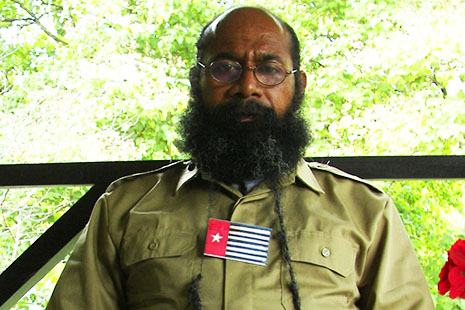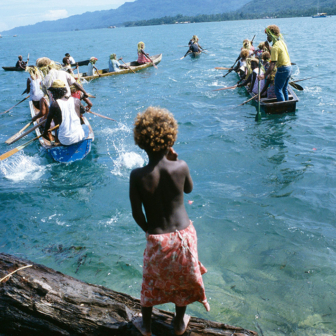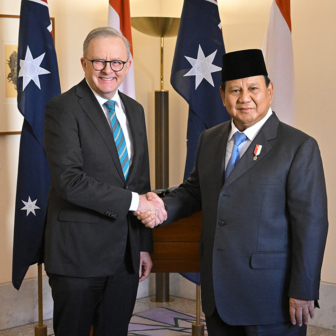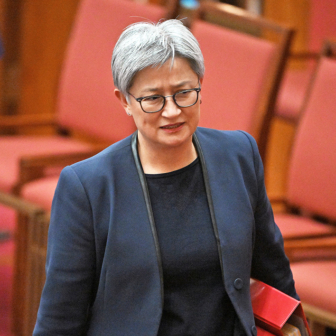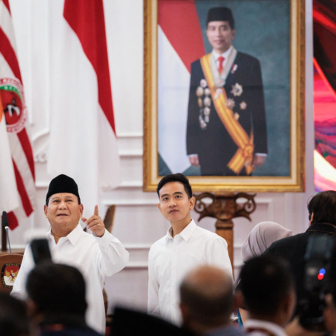I FIRST met Filep Karma in the Papuan capital, Jayapura, in November 2000. Even in the relatively open political climate that prevailed in Papua during the first years after the fall of Suharto, he was a courageous and striking figure. He had recently completed a term in prison for his leadership of the July 1998 flag-raising protest at Biak, which had been suppressed by the security forces with considerable loss of life, and he was wearing the uniform of an official in the provincial government (a position he still occupied) with a Papuan national flag pinned provocatively to his chest. Later, in 2004, he was arrested again for raising the Papuan flag at a peaceful commemoration of 1 December 1961, which is regarded by Papuans as their independence day. In May the following year he was sentenced to fifteen years’ imprisonment on charges of treason, a sentence he is still serving.
At the time we met, Karma was active in the Papua Presidium Council, which was then the dominant pro-independence organisation. Typical of his forthright approach to politics, Karma was critical of the council leadership’s pragmatic and accommodating approach, and once again it was a debate about the flag that brought matters to a head. Earlier that year, as a gesture of reconciliation, President Abdurrahman Wahid had agreed to change the name of the province from Irian Jaya to Papua and had given permission for the Papuan flag to be flown. But, as the year progressed, flag-raisings again became a focus of conflict between the Indonesian authorities and Papuans. The council’s leaders had negotiated a restricted and carefully monitored commemoration and flag-raising with the Indonesian authorities, but Karma asserted that Papua had not become independent in 1961 and so independence needed to be proclaimed at that year’s commemoration – a course of action that would have risked a violent response from the security forces.
In the report I wrote soon after for the International Crisis Group, I used Karma and his provocative attire as a symbol of the dual loyalties of many senior Papuan officials in the Indonesian administration. Some, like Karma, actively supported Papuan independence; others, probably a rather greater number, were sympathetic but not active. The Indonesian authorities knew that Karma was saying publicly what many of his fellow bureaucrats thought and felt. In fact, in mid 2000 an Indonesian intelligence document concluded that the Papua provincial government had been “contaminated” by the independence ideal and recommended that strong sanctions be applied to well-known supporters of Papua Merdeka (Free Papua) among local officials. Filep Karma was one of the officials named in the report.
Attached to the same document was a diagram headed “Papuan Political Conspiracy” that depicted the various groups of Papuans whom the Indonesian intelligence community thought supported independence. In addition to the best-known public advocates, the diagram named local people who had been successful in the Indonesian system, including Barnabas Suebu, who was Indonesia’s ambassador to Mexico and is now governor of Papua, Suebu’s immediate predecessor, another former governor and a number of Papuan members of the Indonesian parliament.
The criminalisation of peaceful political activities, which led to the imprisonment of Filep Karma, has proved effective in keeping Papuan nationalist sentiments off the streets. But the security forces’ concern about the influence of pro-independence ideals among Papuan government officials persists. A 2007 secret report by the Kopassus unit stationed in Kotaraja, a suburb of Jayapura, argued that the activities of the separatists in Papua were centred on the city, where most activists lived. “Most of the separatist group,” it reported, “had become officials in government institutions and occupied important positions.” The separatists were not a large group, but their prominent positions meant that their views were often reported in the media, according to the report. As many young Papuans did not have a strong Indonesian nationalist ideology, the separatists, who “increasingly had an objective of the ideal of Papuan independence,” were able to “influence all levels of society and government institutions.”
The Indonesian authorities’ distrust of Papuan politicians and provincial government officials has made it difficult for Jakarta to implement the 2001 Special Autonomy Law in a way that might have achieved its objective of reducing Papuan support for independence. The law was the government’s response to the revival of the independence movement after the fall of Suharto and provided for a much more extensive devolution of authority and revenue than that granted to other provinces under the regional autonomy laws of 1999.
Earlier this year Agus Sumule – one of Governor Suebu’s advisers, but writing in a private capacity – outlined how the Indonesian government has endeavoured to limit the autonomy devolved to the provincial government in Jayapura. First, he described the practice of distributing the budget allocation of Special Autonomy funds to Papua every couple of months rather than on an annual basis. Sumule argued that an annual allocation of these funds would facilitate optimal planning and program implementation. He understands that the practice of graduated allocation of funds was introduced at the behest of one of the Indonesian intelligence agencies, out of fear that annual distribution would increase the likelihood that the money would be used for “subversive” purposes. Second, he described how there has been virtually no practical devolution of authority to Papua – despite the fact that the Special Autonomy Law devolves authority to the provincial government in all areas of government except foreign affairs, defence and security, finance and religion.
In a similar vein, late last year the Sydney Morning Herald quoted a September 2009 cable from the US embassy in Jakarta that said, “Many central government ministries have been reluctant to cede power to the province. As a result, implementation of the [Special Autonomy] law has lagged and Papuans increasingly view the law as a failure.”
FILEP KARMA’s fifteen-year prison term for raising the Papuan national flag contrasts strikingly with how the Indonesian authorities dealt with the members of the Indonesian security forces who videotaped each other barbarically torturing Papuans. The depravity of the behaviour depicted on the video attracted considerable media attention after it was posted on the internet last October. In January this year a military court in Jayapura sentenced three soldiers from the TNI infantry battalion 753/AVT to ten, nine and eight months respectively for torturing two Papuans, Anggun Pugukiwo and Telenggen Gire, in May last year. The judge, Adil Karo-Karo, found that “the three accused disobeyed their superior’s command and that they had used violence towards civilians.”
In an earlier military trial of soldiers accused of violence against Papuans, also recorded on video, the four accused were given sentences of five to seven months. Like the soldiers in the January trial, they were sentenced for disobeying orders. But the head of the military court noted that the soldiers’ behaviour had tarnished the good name and image of the armed forces in the eyes of society and the world. Speaking to a group of military and police leaders during the January trial, President Susilo Bambang Yudhoyono recognised that there had been acts of violence by the security forces in Papua. “I am concerned about cases in Papua. These acts were not the policies of generals, marshalls or the government. They were incidents.”
The treatment of Filep Karma and the military’s violence against Papuans not only raise questions about the values and functioning of the Indonesian legal system, but also symbolise the governance issues Indonesia faces in Papua. The security forces’ abuses of human rights, the criminalisation of non-violent political activity and the mutual distrust between the Indonesian government and many sections of Papuan society are among the issues that have motivated a concerted effort by Papuan activists – notably the leading Catholic figure, Neles Tebay, and researchers at the government’s Indonesian Institute of Sciences, led by Muridan Widjojo – to promote dialogue between Jakarta and Papua. Tebay and his Papua Peace Network have sought to mobilise Papuan support for dialogue, especially among the independence activists, while Muridan and his colleagues have sought to persuade the government that Papua’s complex and entrenched problems can only be addressed through dialogue, and that dialogue doesn’t mean negotiations for independence.
On the eve of his visit to Australia last month, the Indonesian vice president, Dr Boediono, told the Sydney Morning Herald that the government recognised “there was room for improvement” in its Papua policies and needed to take a broader approach than its usual focus on economic development. But he explicitly ruled out the possibility of a dialogue with Papuans. Boediono also foreshadowed the creation of a new agency that would coordinate policy-making and implementation for Papua. That new agency is the Unit to Accelerate Development in Papua and West Papua, part of a broader reformulation of Papua policy, which has been mentioned in the media at least since November last year.
Djohermansyah Djohan, Indonesia’s director-general of regional autonomy, argued that the unit is needed because special autonomy has been more effective in Aceh, where authority has been devolved to the province under the supervision of the Reconstruction and Rehabilitation Board. “Whatever the circumstances,” Djohermansyah asserted somewhat patronisingly, “the father has the responsibility to take care of the children.” Vice President Boediono’s spokesman, Yopie Hidayat, explained that the new policy, of which the unit is the institutional centrepiece, was expected to “gain optimum results through centralized planning.”
Ironically, the one issue on which there is agreement between the Indonesian government and some of its Papuan critics is that the Special Autonomy Law has failed. Yet this recognition has produced sharply contrasting responses. The government seems intent on reasserting its direct control over Papua and reducing the limited authority that had been devolved to the provincial government. In Jakarta’s new policy framework, the provincial government would remain part of the planning process but won’t have the critical role envisaged in the Special Autonomy Law’s provisions for self-government. As Agus Sumule noted, the draft policy documents being prepared in the vice-president’s office barely mention the position of governor and the role it has played in the development of Papua over the past nine years.
The responses of the Indonesian government and its Papuan critics to the failure of special autonomy are informed by their different understandings of how the conflict in Aceh was resolved. Jakarta focuses on the success of the Reconstruction and Rehabilitation Board in Aceh, and has decided to establish a similar agency, under its direct control, to accelerate development in Papua. Papuans, on the evidence of the public consultations organised by the Papuan People’s Assembly in mid 2010, see the resolution of the conflict in Aceh differently. They want negotiations or dialogue, involving an partner, with the Indonesian government to resolve the political, cultural, historical – as well as economic – dimensions of their conflict with Jakarta. Some Papuans envisage significantly greater autonomy, as happened in Aceh under the Helsinki Agreement and the Aceh Governance Law, but policy-making in Jakarta seems to be heading in the opposite direction.
It is difficult to envisage much progress being made in Papua – with either economic development or the entrenched governance, political, cultural and historical issues that have fuelled Papuan nationalism – unless there is a policy framework that recognises and seeks to address these complex and interrelated issues.
There is no doubt that Indonesia can sustain its rule in Papua. Neither the ad hoc and poorly armed resistance of the Free Papua Movement nor the non-violent activities of numerous pro-independence organisations threaten Indonesian control, and so the government feels little pressure to engage in dialogue. But the governance issues embodied in the treatment of Filep Karma, and grotesquely dramatised in the Indonesian soldiers’ videos, raise questions about the legitimacy of Indonesian rule. After all, the Indonesian government has the responsibility to protect its citizens in Papua.
More generally, the growing gap between the severely constrained political space in Papua and the robust democracy in much of the rest of the country, together with the continuation of human rights abuses by the security forces, is an Achilles heel for an Indonesia aspiring to play a regional and role appropriate for the world’s third largest democracy. •
